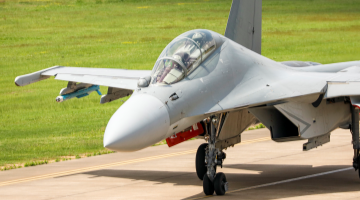
A protester holds a sign calling for cut military spending in an anti-war gathering in front of the Lincoln Memorial in Washington on February 19, 2023, to demand the US to stop fomenting the conflict between Russia and Ukraine and cut its military spending. (Xinhua/Liu Jie)
By Lin Zihan
The White House recently announced its budget for the fiscal year 2024, which plans to allocate US$842 billion to the US Department of Defense (DOD), making it the highest military budget proposed by the US government in history. Experts pointed out that the fundamental purpose of the high military spending is to maintain the hegemony of the US.
Supported by high military spending, the US continues to disrupt the world, bringing destabilizing factors to the world. The uncertainty of the external environment has also become one reason for the US to further increase its military spending, leading to the US being trapped in a vicious circle of the higher the military spending, the less secure it feels.
Highest military expenditure in peacetime
According to the website of the US DOD, the US government's fiscal year 2024 budget proposes a record of US$842 billion for the Pentagon, US$26 billion higher compared with the fiscal year 2023 military budget, and US$100 billion higher compared than the fiscal year 2022 military budget. Currently, the US military spending has exceeded the total of the next nine countries following itself.
According to Reuters' reports, in addition to the US$842 billion allocated to the US Department of Defense, the new budget has also planned to allocate US$44 billion to defense-related projects of the Federal Bureau of Investigation (FBI), the US Department of Energy (DOE) and other agencies. That would make the total defense-related budget of the US reach up to US$886 billion in the fiscal year 2024, the highest defense budget proposed by the US government in the peacetime.
According to a report on the website of the US National Defense Magazine, the US$886 billion military budget is expected to account for 3.2% of the US GDP in 2024, and 47% of the US federal government's discretionary spending.
Reuters said that the US Congress would discuss the fiscal year 2024 budget in the coming months, and may further increase military spending on the basis of the budget proposed by the White House.
Still trapped by a false hegemonic dream
Yuan Zheng, deputy director and researcher of the American Institute of the Chinese Academy of Social Sciences, said that the fundamental purpose of the US in maintaining high military spending is to maintain its own hegemony. In terms of diplomacy, the US has always believed in the law of the jungle, unswervingly recognizing its military strength as an important pillar of the US' global hegemony, and affirming that it is necessary to increase investment in military expenditure to maintain the US' hegemonic position and enhance its so-called ability to intervene in international affairs.
"In recent years, the US has had its strategic focus drawn back to the so-called great power competition, viewing countries like China and Russia as the main 'challenges' and' threats', and hoping to maintain strong military deterrence in the face of the so-called strategic opponents. Therefore, it has continuously increased its military spending, making a dramatically increasing trend in the US military spending. At the same time, the US has kept providing military assistance to Ukraine, resulting in a decline in US domestic ammunition inventory, which requires the purchase of more ammunition to make up for, further pushing up the US military spending. In addition, factors like inflation also have an impact on the rise in military spending", said Yuan.
"In today's world, from the Russia-Ukraine conflict, the Iran nuclear issue to the South China Sea dispute, many conflicts and disputes have had the shadow of the US behind them," said Zhou Fangyin, vice president of the Guangdong Institute for International Strategy (GIIS). "The US has always regarded military hegemony as a core means to achieve its strategic objectives and hoped to seek other interests through military superiority. At the same time, the US also intends to enhance the confidence of its allies in the US by increasing its military investment, so as to maintain the US-led alliance system."
An article titled "Why America remains trapped by false dreams of hegemony" was published recently on the website of the US' bimonthly Foreign Affairs magazine by Andrew Bacevich, a professor emeritus of International Relations and History at Boston University. According to the article, the US foreign policy institutions insist that the world needs more American military power, and the tragic defeats in the Iraq and Afghanistan wars have not prevented the US from continuing to bet on military investment. For decades, the US has wasted a great deal of its wealth and sacrificed thousands of American lives due to military misjudgment. According to analysis of the Cost of War project at Brown University, it is estimated that since the 9/11 attacks, the US has spent approximately US$8 trillion on global military operations, the costs of which have far outweighed the gains.
Dangerous signal
High military spending is to continue to support the US military operations overseas. According to data compiled by the US Congressional Research Service, the US media found that from 1798 to 2022, the US launched a total of 469 military operations overseas. In just over 30 years since the end of the Cold War alone, 251 military activities have been launched, far exceeding the total number of over 190 years before the end of the Cold War. The objectives of these military operations involved the vast majority of countries across the world.
Stimulated by a new round of high military spending, the US military plan is to grow even more active. According to the website of US's Defense News, the funds allocated to the US DOE by the US new fiscal year budget will provide a "strong technical and engineering foundation" for the AUKUS trilateral security partnership. A few days ago, the US, the UK, and Australia have just announced a new cooperation plan on nuclear-powered submarines, marking another dangerous step forward in the nuclear proliferation activities of the three countries.
Yuan Zheng stated that the US believes in force and is obsessed with increasing military spending and enhancing its ability to intervene in foreign countries. The concept has violated the purposes of the Charter of the United Nations as well as the basic norms of international relations based on international law and runs counter to the trend of peace and development across the world. Currently, in addition to fortifying its military strength, the US is also significantly increasing spending on the research and development and procurement of weapons to promote the modernization of its military equipment, which is a dangerous signal for other countries. This move will stimulate another arms race, exacerbate international tensions, and undermine the global strategic balance.
"The hike in the US military spending has also rendered relations between major powers even tenser." Yuan said, "The US regards China and Russia as its main strategic competitors, engaging in proxy wars behind the Ukrainian crisis, trying to bring down and consume Russia, while fully containing China constantly under the pretext of the situation in the South China Sea and across the Taiwan Strait. These actions have seriously endangered regional peace and security, brought destabilizing factors to the world, and are by no means favorable for global strategic stability."
Zhou Fangyin said that the US is currently trapped in a vicious cycle of military spending expansion. On the one hand, in the name of safeguarding world security, the US has significantly increased military spending, creating conflicts around the world. On the other hand, in order to intervene in these conflicts, the US is in need of huge financial support, which will in turn further increase military spending. For many years, it has been hard for the US to extricate itself from the vicious cycle.
Editor's note: Originally published on people.com.cn, this article is translated from Chinese into English and edited by the China Military Online. The information and opinions in this article do not necessarily reflect the views of eng.chinamil.com.cn.









